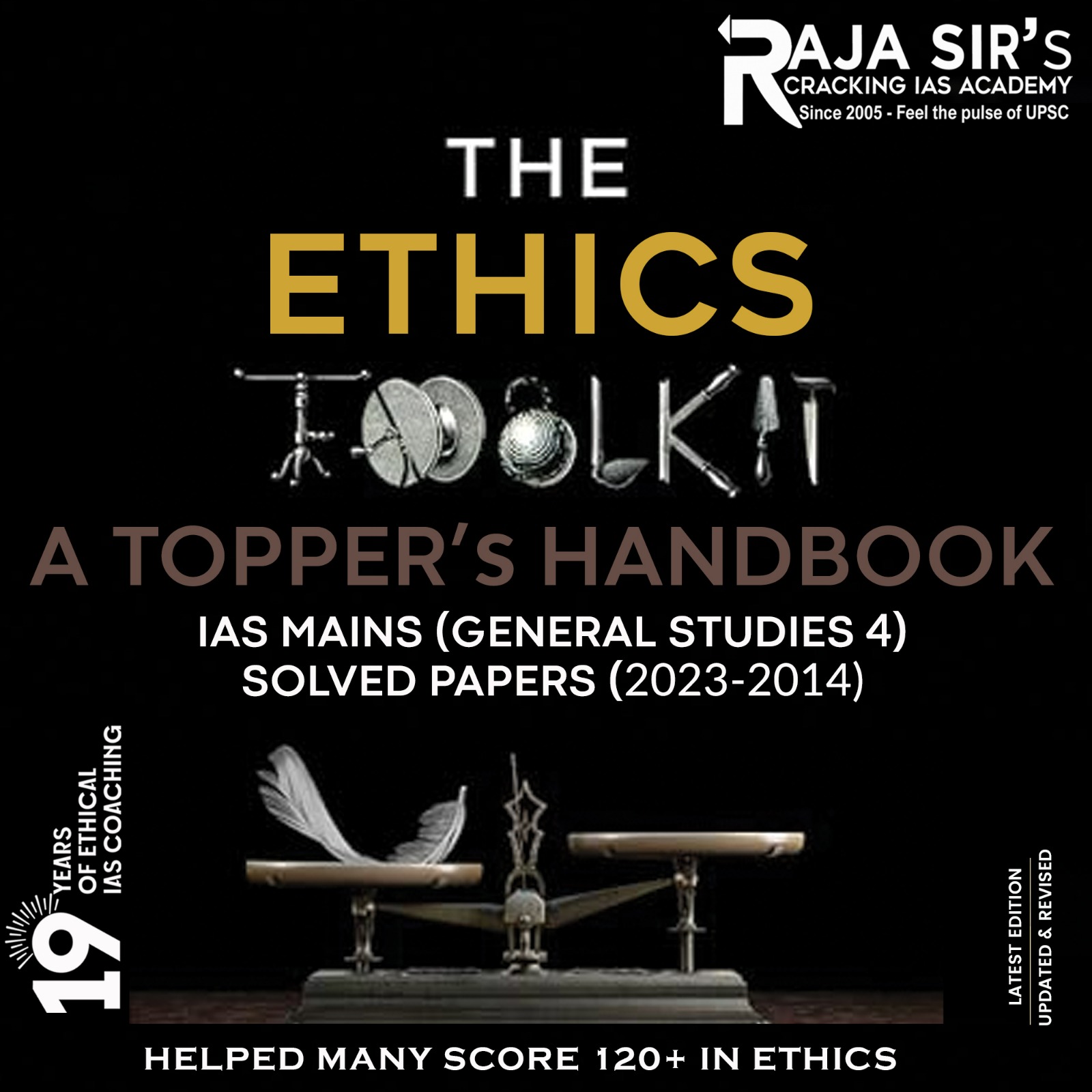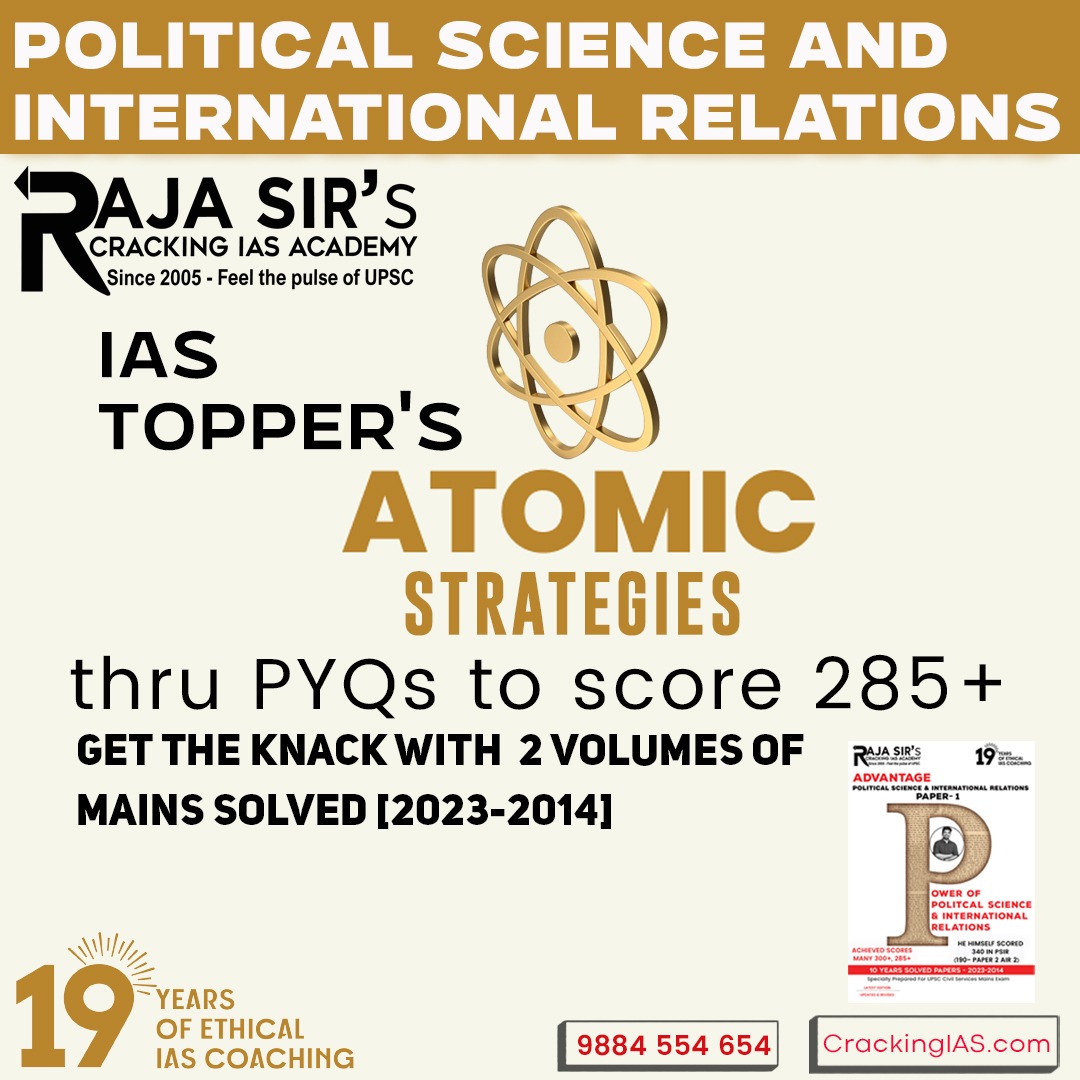- Home
- Prelims
- Mains
- Current Affairs
- Study Materials
- Test Series
Hit List Questions 74-PPP 100 PRELIMS 2024 - 92
Questions & Explanations:
|
1. |
Consider the following pairs I. Colliding black holes II. Colliding neutron stars Which of the above produce gravitational waves? (a) Only I (b) Only II (c) Both I & II (d) Neither I nor II
|
|
|
2. |
Consider the following statements regarding Beki River’: 1. It originates in Tibet. 2. It is a right bank tributary of Brahmaputra. Which of the following statements is/are correct?. (a) 1 only (b) 2 only (c) Both 1 and 2 (d) Neither 1 nor 2
|
|
|
3. |
Consider the following statements w.r.t. Cretaceous Period. 1. It is is the last of the three periods of the Mesozoic Era. 2. It followed the Jurassic Period. 3. It was succeeded by the Paleogene Period. How many of the above statements is/are false?. (a) Only 1 statement (b) Only 2 statements (c) All the 3 statements (d) None of the statements
|
|
|
4. |
Consider the following statements w.r.t. Lithium: 1. It has the lowest density of all metals. 2. It is the lightest of the solid elements. 2. It is the hardest of the alkali metals. Which of the above statements is/are correct?. (a) 1, 2 and 3 (b) 1 and 3 only (c) 2 only (d) 3 only
|
|
|
5. |
Consider the following. I. Ice Melting II. Groundwater depletion III. Eccentricity of the Earth''s orbit Which of the statements given above is/are the correct reasons for “Polar Motion”?. (a) Only I & II (b) Only II & III (c) I. II & III (d) III only
|
|
|
6. |
Exclusive economic zone (EEZ), as defined under the UNCLOS, is an area of the ocean extending up to (a) 370 km immediately offshore from a country’s land coast in which that country retains exclusive rights to the exploration and exploitation of natural resources. (b) 200 km immediately offshore from a country’s land coast in which that country retains exclusive rights to the exploration and exploitation of natural resources. (c) 220 km immediately offshore from a country’s land coast in which that country retains exclusive rights to the exploration and exploitation of natural resources. (d) 300 km immediately offshore from a country’s land coast in which that country retains exclusive rights to the exploration and exploitation of natural resources.
|
|
|
7. |
I. It is a steroidal hormone. II. It is responsible for obesity. Which of the above statements is/are true w.r.t. Taurine?. (a) Only I (b) Only II (c) Both I & II (d) Neither I nor II
|
|
|
8. |
Identify the correct statement(s) w.r.t. met coke. 1. It is used as an oxidising agent in the production of iron and steel. 2. It has also a low volatile content. (a) 1 only (b) 2 only (c) Both 1 and 2 (d) Neither 1 nor 2
|
|
|
9. |
Spodumene, Petalite, and Lepidolite yield (a) Stannum (b) Lithium (c) Titanium (d) Plutonium
|
|
|
10. |
What was the “Calico Act”?. (a) It was a legislation banning the use of printed cotton textiles in England. (b) It was a legislation banning the use of artificial dyes in India. (c) It was a legislation banning the use of handloom textiles in India. (d) It was a legislation promoting the use of vegetable dyes like Indigo in England.
|
|
|
11. |
Which of the following is incorrect about Mediterranean Sea?. (a) Morocco, Algeria, Tunisia, Libya and Egypt have coasts on the Mediterranean Sea. (b) It is connected to the Red Sea via the Suez Canal, (c) There is a continuous movement of water from the Atlantic into the Mediterranean and vice versa through the Strait of Gibraltar. (d) It is connected to the Atlantic Ocean via the Bosporus Strait.
|
|
|
12. |
Which of the following is/are true w.r.t. Khadi and Village Industries Commission? 1. It is a statutory body. 2. Its Nodal Ministry is Ministry of Rural Development. (a) 1 only (b) 2 only (c) Both 1 and 2 (d) Neither 1 nor 2 o |
|
|
13. |
Which one of the following commissions is associated with the Army Reorganization after the suppression of the Revolt of 1857? (a) Frazer Commission (b) Peel Commission (c) Campbell Commission (d) Mansfield Commission |
|
|
14. |
Who among the following was the first European to initiate the policy of taking part in the quarrels of Indian princes with a view to acquire territories? (a) Clive (b) Dupleix (c) Albuquerque (d) Warren Hastings
|
|
|
15. |
1. Warren Hastings followed a policy of ring-fence, which aimed at creating buffer zones to defend the Company’s frontiers. 2. The subsidiary alliance system was used by Lord Wellesley, which allowed the permanent stationing of a British force within the territory of an allying Indian ruler and to pay a subsidy for its maintenance. 3. Under the doctrine of lapse policy followed by Lord Dalhousie, the adopted son could be the heir to his foster father’s private property, but not the state; it was for the paramount power (the British) to decide whether to bestow the state on the adopted son or to annex it. Which among the above statements are correct w.r.t. to the British administrative policy during the late 18th century and the late 19th century? (a) 1 and 2 only (b) 2 and 3 only (c) 1 and 3 only (d) 1, 2 and 3
|
|
|
16. |
1. ‘Peace Pipeline’ will start from the Galkynysh in Iran. 2. ‘Peace Pipeline’ will run through Kandhar and Herat highway in Afghanistan. (a) Only (1) is true (b) Only (2) is true (c) Both (1) & (2) are true (d) Neither (1) Nor (2) is true
|
|
|
17. |
1. It is caused by Norovirus. 2. It is more common in the winter. Which of the above statements is/are correct w.r.t. ‘stomach flu’? (a) 1 only (b) 2 only (c) Both 1 and 2 (d) Neither 1 nor 2
|
|
|
18. |
1. Lord Canning was Governor-General of India when this act was passed. 2. It gave the Christian converts the right to inherit their ancestral properties. Which of the above is/are true w.r.t. “Lex Loci Act”?. (a) 1 only (b) 2 only (c) Both 1 and 2 (d) Neither 1 nor 2
|
|
|
19. |
1. The Sixth Schedule provides a list of ten tribal areas. 2. The Sixth schedule areas remain within the executive authority of the state. In relation to Indian Constitution, (a) Only (1) is true (b) Only (2) is true (c) Both (1) & (2) are true (d) Neither (1) Nor (2) is true
|
|
|
20. |
''Cachar Levy'', formed in 1835 refer to the context of (a) Paramilitary force (b) Taxation policy (c) Land Revenue Policy (d) Divid-Et-Impera policy
|
|
|
21. |
Consider the following statements about the Mahalwari System of British India: 1. Holt Mackenzie devised this. 2. The revenue was permanently fixed. 3. It was introduced in Bengal and Bihar. Which of the statements given above is/are incorrect? (a) 2 and 3 only (b) 2 only (c) 1 and 2 only (d) 1 and 3 only
|
|
|
22. |
Consider the following statements regarding Neutrinos. 1. They are undisturbed by even the strongest magnetic field. 2. They are produced by the same sources as cosmic rays. 3. They rarely interact with matter. Which of the above statements is/are correct? (a) 2 and 3 only (b) 1 and 3 only (c) 1 and 2 only (d) 1, 2 and 3
|
|
|
23. |
Consider the following statements w.r.t. International Energy Agency. 1. It is an agency under UN. 2. It has India as its member. Which of the above statements is/are false?. (a) Only 1 (b) Only 2 (c) Both 1 and 2 (d) Neither 1 nor 2
|
|
|
24. |
Consider the following statements with respect to Lord Lytton. 1. He followed a spirited Forward policy towards Afghanistan. 2. The idea of the Delhi Durbar was first proposed by him. 3. For the Indian Civil Service Examination, he increased the maximum age limit. 4. He followed the “Policy of Proud Reserve” towards the Indian princely states. Which of the statements given above is/are correct?. (a) 1, 2 and 4 only (b) 1, 2 and 3 only (c) 1, 3, and 4 only (d) 1, 2, 3 and 4
|
|
|
25. |
Diego Garcia Island, is located in (a) South Pacific Ocean (b) Indian Ocean (c) North Atlantic Ocean (d) Red Sea
|
|
EXPLANATIONS
|
1. |
https://iasgoogle.com/current_affair/june-21-current-affairs-2023 |
C |
|
|
2. |
https://iasgoogle.com/current_affair/june-22-current-affairs-2023 |
B |
|
|
3. |
https://iasgoogle.com/current_affair/june-18-current-affairs-2023 |
D |
|
|
4. |
Properties of Lithium · Lithium is a silvery white metal. · It is the hardest alkali metal but still is soft enough to be cut with a knife. · Atomic and ionic radii of lithium are the lowest amongst alkali metals. · Li has highest melting point among the alkali metals. · Lithium is highly reactive element. However, among alkali metals lithium is the least reactive. Uses of Lithium · Lithium Uses of Lithiumlead alloy (0.05% Li) which is used for making toughened bearings and sheets for cables. · Lithium – Aluminium alloy has great tensile strength and elasticity like that of mild steel. It is used for air craft construction. · Lithium – magnesium alloy (with 14% Li) is extremely tough and corrosion resistant which is used for armour plate and aerospace components. · Lithium is used for refining of metal like copper and nickel as it combines readily with oxygen and nitrogen and thus removes the last traces of oxygen and nitrogen. · Lithium chloride is used in air conditioning plants to regulate the humidity. · Lithium aluminium hydride (LiAlH4) is used as a reducing agent in synthetic organic chemistry · Lithium carbonate is used in making special variety of glass which is very strong and is weather proof. |
A |
|
|
5. |
https://iasgoogle.com/current_affair/june-30-current-affairs-2023 |
A |
|
|
6. |
https://iasgoogle.com/current_affair/june-23-current-affairs-2023 |
A |
|
|
7. |
D |
||
|
8. |
It is used as a fuel and reducing agent in the production of iron and steel. https://iasgoogle.com/current_affair/july-05-current-affairs-2023 |
B |
|
|
9. |
B |
||
|
10. |
By the early eighteenth century, worried by the popularity of Indian textiles, wool and silk makers in England began protesting against the import of Indian cotton textiles. In 1720, the British government enacted a legislation banning the use of printed cotton textiles – chintz – in England. Interestingly, this Act was known as the Calico Act. At this time textile industries had just begun to develop in England. Unable to compete with Indian textiles, English producers wanted a secure market within the country by preventing the entry of Indian textiles. The first to grow under government protection was the calico printing industry. Indian designs were now imitated and printed in England on white muslin or plain unbleached Indian cloth.
|
A |
|
|
11. |
It is an intercontinental sea that is bordered by the continent of Europe in the north, by Asia in the east, and by Africa in the south. In the west, the Mediterranean Sea is connected to the Atlantic Ocean via the narrow Strait of Gibraltar. In the extreme northeast, it is connected to the Black Sea via the Dardanelles Strait, the Sea of Marmara, and the Bosporus Strait. The Mediterranean Sea is also connected to the Red Sea via the Suez Canal in the southeast. https://iasgoogle.com/current_affair/june-20-current-affairs-2023 |
D |
|
|
12. |
https://iasgoogle.com/current_affair/july-06-current-affairs-2023 |
A |
|
|
13. |
Peel Commission Peel Commission was set up in 1857. After the First freedom struggle of 1857, the British government sought to bring changes in the military system. Peel Commission was headed by Jonathan Peel. Peel Commission suggested reforms, and the British government accepted these recommendations and redesigned the military. While reorganizing the Indian army in the post-1857 revolt, the Jonathan Peel Commission had the task of identifying social groups and regions from which “loyal” soldiers could be recruited. It divided the regiments of the army on the basis of caste, community, and religion. The commission recommended a 1:2 ratio of British to Indian soldiers in Bengal, 1:3 ratio in Madras and Bombay. Recruiting of soldiers was seen more in terms of the communities to which they belonged rather than as individuals. Caste, religion, and ethnicity, or race became more crucial while enlisting a soldier. https://iasgoogle.com/editorial/committees-amp-commissions-during-british-rule |
c |
|
|
14. |
Dupleix succeeded Dumas as the French governor of Pondicherry. His ambition now was to acquire for France vast territories in India, and for this purpose he entered into relations with the native princes, and adopted a style of oriental splendour in his dress and surroundings. He built an army of native troops, called sepoys, who were trained as infantrymen men in his service also included the famous Hyder Ali of Mysore. Colonial administrator and governor-general of the French territories in India, who nearly realized his dream of establishing a French empire in India. |
B |
|
|
15. |
The Policy of Ring-Fence: Warren Hastings took charge as the governor general at a critical period of British rule when the British were to encounter the powerful combination of the Marathas, Mysore, and Hyderabad. He followed a policy of ring-fence which aimed at creating buffer zones to defend the Company’s frontiers. Broadly speaking, it was the policy of defence of their neighbours’ frontiers for safeguarding their own territories. Subsidiary Alliance: The subsidiary alliance system was used by Lord Wellesley, who was governor general from 1798–1805, to build an empire in India. Under the system, the allying Indian state’s ruler was compelled to accept the permanent stationing of a British force within his territory and to pay a subsidy for its maintenance. The Indian ruler had to agree to the posting of a British resident in his court. The Indian ruler could not employ any European in his service without the prior consultation with the Company. Nor could he go to war or negotiate with any other Indian ruler without consulting the governor-general. In return for all this, the British would defend the ruler from his enemies and adopt a policy of non-interference in the internal matters of the allied state. Doctrine of Lapse: In simple terms, the doctrine stated that the adopted son could be the heir to his foster father’s private property, but not the state; it was for the paramount power (the British) to decide whether to bestow the state on the adopted son or to annex it. Though this policy is attributed to Lord Dalhousie, he was not its originator. Dalhousie showed too much zeal in enforcing this policy which had been theoretically enunciated on some previous occasions. |
D |
|
|
16. |
B |
||
|
17. |
C |
||
|
18. |
Lex Loci Act, 1850 was passed during the governorship of Lord Dalhousie. It was basically an inheritance law meant to protect those Hindus who converted to the Christianity. |
B |
|
|
19. |
https://iasgoogle.com/current_affair/june-28-current-affairs-2023 |
C |
|
|
20. |
https://iasgoogle.com/current_affair/june-21-current-affairs-2023 |
A |
|
|
21. |
https://iasgoogle.com/editorial/land-revenue-policy-of-british-in-india |
A |
|
|
22. |
https://iasgoogle.com/current_affair/june-30-current-affairs-2023 |
D |
|
|
23. |
https://iasgoogle.com/current_affair/june-16-current-affairs-2023 India, which joined the IEA Family as an Association country in 2017, sent a formal request for full membership to IEA ministers in October 2023. India becoming an IEA member would mark a huge, consequential change in international energy governance. As the world’s most populous country, India is set to play an increasingly central role in efforts to safeguard energy security, drive inclusive energy transitions, and combat climate change. |
C |
|
|
24. |
Lord Lytton served as Viceroy of India from 1876 to 1880. He was an English politician. He is well known as a brutal viceroy due to the way he handled the Second Anglo-Afghan War and the Great Indian Famine of 1876–1878. When he was sent to Florence in 1852, his diplomatic career really got going. Before being named British Consul General in Belgrade in 1860, he worked in a number of other European capitals, such as St. Petersburg, Vienna, and Paris. Royal Titles Act 1876 One of Prime Minister Disraeli’s infamously imperialist policies was the Royal Titles Act of 1876. The British imperial title was agreed to be used only in India. It was first used by the Queen in 1878 and on British coins in 1893. At the Delhi Durbar in 1877, she was given the formal title Kaisar-i-Hind, which means “Empress of India.” Delhi Darbar Of 1877 A Grand Darbar was held in Delhi on January 1, 1877, a few months after Queen Victoria was sworn in as the country’s viceroy and declared the empress of India. The “Kaisar-i-Hind” title was bestowed upon Queen Victoria during this Darbar. Great Famine Of 1876 The monsoon season in 1877 wasn’t much better because the ones in 1876 had failed to produce the proper amount of rain. This prolonged drought, which spanned from the Deccan to Cape Comorin and then moved to northern India, resulted in a famine that was more widespread than any other known in Indian history. Some historians have claimed that the Poet Viceroy Lord Lytton was directly responsible for the murder of 10 million people during the Famine of 1876–1877 because of his unwavering implantation of British trading policies. Vernacular Press Act 1878 The country’s vernacular press experienced a notable expansion in the second half of the 19th century, and newspapers helped to spark the emergence of a new sociopolitical consciousness. Newspapers used to only be published in Calcutta, Madras, Bombay, and Allahabad, but later began to appear in other, smaller cities as well. Since the majority of newspapers were produced in smaller cities, they were all written in regional tongues. There were 20 English newspapers when this statute was passed in 1878, but there are now 200. The people were aware of political issues thanks to these local media, and they gradually began to inquire about their rights. Therefore, Lord Lytton passed the Vernacular Press Act in the interests of the Government. Second Anglo-Afghan War 1878-80 The events of Afghanistan once more compelled attention in the winter of 1878. The British were humiliated at the end of the First Anglo-Afghan War in 1842, and this defeat followed them for a long time. Treaty of Peshawar (1855): In 1855, Dost Mohammad and the British signed the Treaty of Peshawar, which reestablished diplomatic ties. After a string of occurrences, Russia drew a firm line between Afghanistan and its lands in 1873. Treaty of Gandamak (1879): During the second Anglo-Afghan war, the British took control of a sizable portion of Afghanistan. After losing, Sher Ali fled in the direction of Turkistan. Mohammad Yaqub Khan, Sher Ali’s son, signed the Gandamak Treaty in May 1879 to stop a British invasion of the rest of the nation.
|
A |
|
|
25. |
Dozens of migrants have been stranded for months on Diego Garcia Island in the Indian Ocean after being rescued from their struggling fishing boat. It is a coral atoll, the largest and southernmost member of the Chagos Archipelago, in the central Indian Ocean. It is a part of the British Indian Ocean Territory. It consists of a V-shaped sand-fringed cay and its lagoon is open at the north end. This island was discovered by the Portuguese in the early 16th century. Mauritius claims the archipelago as its own. |
B |









 Latest News
Latest News




 General Studies
General Studies